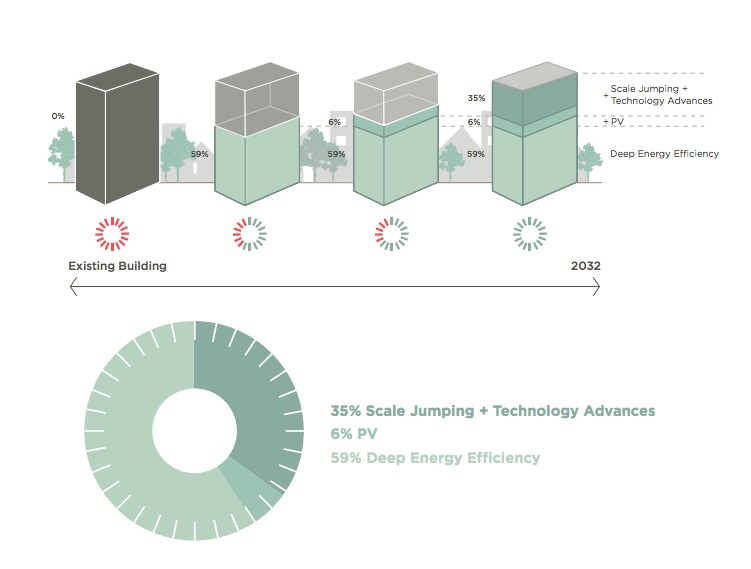The District of Columbia has more green buildings than other large U.S. cities on a per capita basis, according to the 2012 Green Building Report. D.C.’s policies have made it a leader in highly efficient building construction and renovation.
New goals will likely prompt the District to raise the efficiency bar even higher. To help guide policies for a new era of green design, D.C.’s Department of the Environment commissioned a study to assess costs and benefits associated with net zero energy, net zero water, and Living Buildings.
The Net Zero and Living Building Challenge Financial Study: A Cost Comparison Report for Buildings in the District of Columbia was conducted by International Living Future Institute, New Buildings Institute, and Skanska. The team’s analysis identified incremental cost premiums for deep energy and water conservation as well as for photovoltaic and water reuse systems that would bring a project to net zero.
The cost premium for energy efficiency was 1%-12% depending on building type, and rose to 5%-19% for net zero energy. “If the owner has sufficient tax appetite, tax credits and renewable energy credits make the return on investment approximately 30%, whereas the return on investment for energy efficiency alone was in the range of 5-12%,” the report says.
Read the full report at: http://newbuildings.org/net-zero-living-building-challenge-financial-study
Related Stories
| Mar 30, 2012
CSI webinar: Durable & energy efficient building envelope design, April 24
This seminar will review recent changes in North America energy codes, examples of building enclosure wall assemblies being considered for code compliance, potential moisture management and durability challenges, and design tools that could be used to assess and minimize potential problems.
| Mar 30, 2012
Improved construction that followed seismic codes helped avert loss of life in Mexico temblor
A magnitude-7.4 earthquake that shook Mexico from Mexico City to Acapulco damaged hundreds of homes and sent thousands fleeing from swaying office buildings, yet no one was killed, according to early reports.
| Mar 30, 2012
Chicago may allow people to live in retail spaces
The Chicago City Council’s Zoning Committee approved a zoning change that will allow up to 50% of work space in low-intensity business districts to be used for living space.
| Mar 30, 2012
LEED growing fast in the housing rental market
Last year, developers of 23,000 U.S. multifamily housing units applied for LEED certification.
| Mar 30, 2012
Forest Stewardship Council critical of proposed LEED 2012 changes
According to the Forest Stewardship Council (FSC), the third draft of LEED 2012, if approved as written, would represent a step backward from the current Certified Wood Credit.
| Mar 22, 2012
Symposium on water efficiency: How much more water can be saved?
The Third International Emerging Technology Symposium by IAPMO and the World Plumbing Council features a session on water efficiency.
| Mar 22, 2012
Broker doesn’t have to inform contractor that insurer went broke, California court rules
A California appellate court ruled that an insurance broker did not have a duty to inform a subcontractor that a project’s insurer had gone bankrupt.
| Mar 22, 2012
Public agencies shouldn’t negotiate project labor agreements, says AGC official
When a public agency rather than the contractor negotiates a PLA with unions, it interferes with the right of employers and workers to reach their own agreements on working conditions and benefits, says Steve Isenhart, president of the Associated General Contractors of Washington.
| Mar 22, 2012
Proposed rule would let crane operators get licenses without prior city experience
The Bloomberg administration is considering letting operators of giant tower cranes get their license without requiring that they first run cranes as apprentices in the city for three years.
















